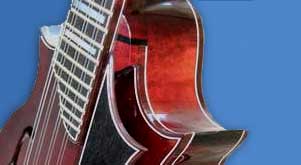« The Ab Position |
Main
| Rhythm Guitar/Mandolin »
 May 6, 2006 | A String Primer May 6, 2006 | A String Primer
Forgive us for being a bit remedial on this but if you're an inexperienced player, or just never have been into the technical side of equipment, this might be some insight into acquiring the kind of strings you need to achieve the sound you want.
We're unabashedly fond of Flatwound strings for reasons we'll go into shortly but first, let's explore the tonal difference between Roundwound and Flatwound, as well as bronze vs. nickel or steel. Roundwound strings are predominantly popular in Folk/Bluegrass and any environment where projection is needed. They have what we call "BRZ," or Bright, Ringy, Zingy tone, very much emphasizing the higher partials of a string's overtone series. Flatwound strings focus more on the fundamental and lower partials, yielding a less complex and some would argue "duller" sound.
Flatwound are wrapped tighter and offer the residual by-product of longer shelf life and playing-time simply because they resist oxidation and corrosion brought on by perspiration, age, and vibration. The smooth feel is desired by some who long for the quiet moving across or up and down the fingerboard. Roundwound offer "grip" and many happily sacrifice string life for the more "present" tone.
String construction is a factor. Bronze strings are generally brighter, Phosphor Bronze brighter yet. Strings can also be Nickel or Steel, which won't be as brilliant. In the last few years, string manufacturers have offered a "coated" string which can also slow deterioration, albeit at a significantly higher cost. There are different approaches to coating the string. Elixir coats the string after it's wrapped, D'addario coats the winding itself before being wrapped over the string core. The way it's wrapped will also affect string feel; some like the "smoothness" while others are critical of the lack of finger traction.
Gauging and thickness can be an issue. Heavier gauges allow you to play harder and give more resistance while Medium or lighter strings yield more facility and player sensitivity. Results will depend on the set-up of your instrument, how high the action is or how well-dressed the frets are. A good repair tech can breathe an amazing amount of life into your instrument with some professional attention. If you have never had this done, you are probably missing out on the best potential of your instrument. Understand most instruments don't come set-up well, let alone adjusted to your unique playing style.
Lastly, don't forget the factors of playing environment. What sounds good to you on your lap playing alone on the front porch can have an entirely different result playing with others. Larger groups (or louder competing instruments) may force you into somewhat of a compromise.
Don't be afraid to experiment with string brands. Just because something works for someone else doesn't mean it will work for your instrument or playing style. Many players with multiple instruments will use a different brand or gauge depending on the individual instrument's tonal characteristics.
Posted by Ted at May 6, 2006 11:22 AM

Disclaimer: In the 'Information Age' of the 21st Century,
any fool with a computer, a modem, and an idea can
become a self-professed 'expert." This site does not
come equipped with 'discernment.'
|



